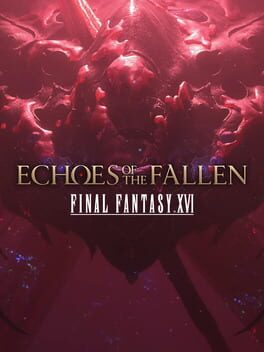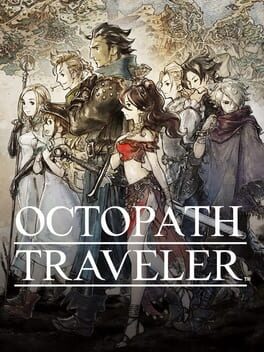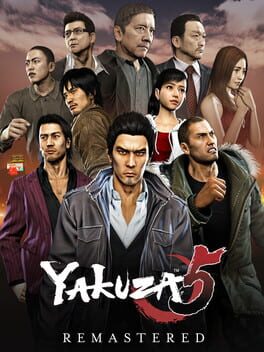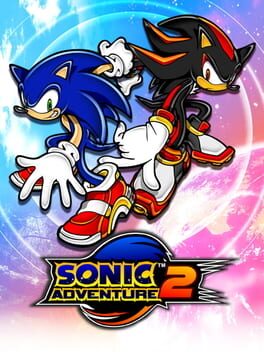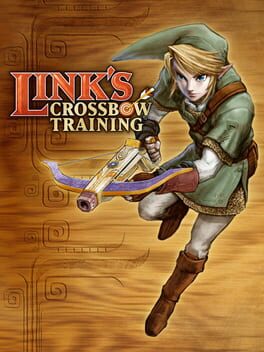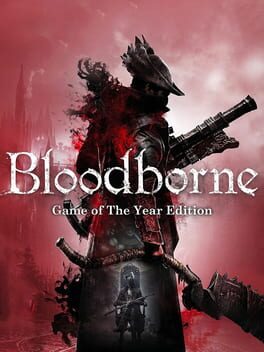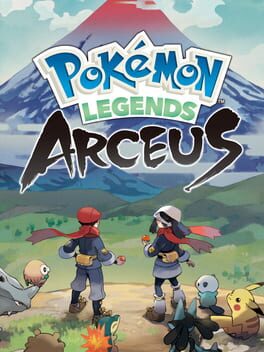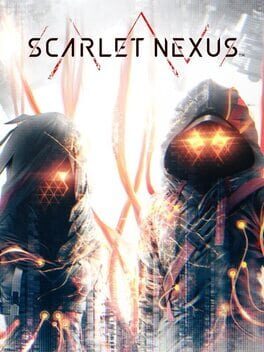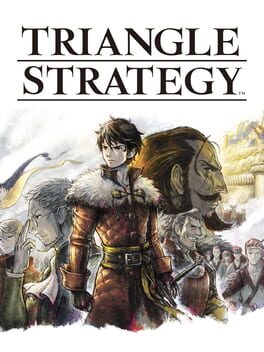brosbeforecrows
28 Reviews liked by brosbeforecrows
I jumped for joy at another chance to get back into my 2023 Game of the Year in Final Fantasy XVI with the surprise announcement of this DLC at The Game Awards. Imagining I was in for a brief experience, and with a three-four hour runtime I was, I'd hoped that Echoes of the Fallen with its bombastically vibrant trailer would capture the jaw-dropping magic that the main title was able to do. Generally it speaking it did, but there did exist flaws within this short DLC that I found unfortunately a little too much to ignore.
Visual Clarity is a big thing for me in games, I really like being able to see the ooh's and ahh's but not at the expense of mechanical understanding and movement within an encounter. FFXVI had a few moments in the eikon fights that I legitimately could not tell what was going on, it's something I struggle with in games and FFXVI was a prime example of where this happens. Echoes of the Fallen contains a few miniboss fights with a major boss at the end. The first miniboss was mostly alright but again just awkward enough in the amount of touhou level mechanics thrown at you that I got hit by moves I thought I normally wouldn't. Where it really got bad was in the last fight against the big bad, I almost threw my hands up in the air in a bout of intensified confusion because of all the visual clutter. I loved FFXVI, I love the scale of these fights, but there's only so much purples/reds/yellows that I can take coming at each and every angle all the time before my ability to follow what's going on is completely lost.
Outside of slight complaints, the location itself was really neat, the runtime probably perfect for a near to end-game DLC addition, but the visual overload and combo-locking bosses was unfortunately not my cup of tea. Once more, Masayoshi Soken delivers a fantastic (yet short) soundtracking experience, the ultimate boss theme being one of the cooler tracks in the entire game. I recommend this if you're playing through FFXVI, but maybe not a must-see for players thinking about getting back into it.
Visual Clarity is a big thing for me in games, I really like being able to see the ooh's and ahh's but not at the expense of mechanical understanding and movement within an encounter. FFXVI had a few moments in the eikon fights that I legitimately could not tell what was going on, it's something I struggle with in games and FFXVI was a prime example of where this happens. Echoes of the Fallen contains a few miniboss fights with a major boss at the end. The first miniboss was mostly alright but again just awkward enough in the amount of touhou level mechanics thrown at you that I got hit by moves I thought I normally wouldn't. Where it really got bad was in the last fight against the big bad, I almost threw my hands up in the air in a bout of intensified confusion because of all the visual clutter. I loved FFXVI, I love the scale of these fights, but there's only so much purples/reds/yellows that I can take coming at each and every angle all the time before my ability to follow what's going on is completely lost.
Outside of slight complaints, the location itself was really neat, the runtime probably perfect for a near to end-game DLC addition, but the visual overload and combo-locking bosses was unfortunately not my cup of tea. Once more, Masayoshi Soken delivers a fantastic (yet short) soundtracking experience, the ultimate boss theme being one of the cooler tracks in the entire game. I recommend this if you're playing through FFXVI, but maybe not a must-see for players thinking about getting back into it.
Octopath Traveler
2018
I cannot explain how much I love this game. This game frustrated the hell out of me, but in a good way. It kept me coming back. I died a lot, but each time I died, I benefitted. Finding the perfect cast of characters for each boss and pulling off perfect strategy is so satisfying. There isn’t a bad character in the game, they are all great for their own skills. And though I wasn’t sure if I’d like the “second job” option, it became really fun really quickly. The game is an eye-gasm to say the least, it’s gorgeous to look at, not to mention the soundtrack that lives in my head rent-free. The voice acting is above and beyond. Needless to say, this game had a death-grip on me and I grew fonder and fonder of it the more I played it. Each character became very special to me. I know this is one of those ‘either you love it or you hate it’ kind of games to people but I can honestly say it’s one of my favorite games I’ve ever played.
Yakuza 5 Remastered
2019
Elden Ring
2022
Sonic Adventure 2
2001
Sonic Adventure 2 is a perfect allegory for the police as an organization, and considering their denomination — GUN — an immortalized reminder of their brute force and willful incompetence.
From the wrongfully attempted persecution of our titular hero, to the attempted murder of a harmless turtle, and finally the actual murder of a small child, there are no punches being pulled here. GUN is vicious, uncaring, and irresponsible.
Just like the non fictional industry they represent.
Sonic knows these people cannot be reasoned with. He outruns them, defaces their property, and smashes the system whenever it stands in his way.
He's our true boy in blue.
From the wrongfully attempted persecution of our titular hero, to the attempted murder of a harmless turtle, and finally the actual murder of a small child, there are no punches being pulled here. GUN is vicious, uncaring, and irresponsible.
Just like the non fictional industry they represent.
Sonic knows these people cannot be reasoned with. He outruns them, defaces their property, and smashes the system whenever it stands in his way.
He's our true boy in blue.
This review contains spoilers
This is the best Zelda game I ever played. Like, the story is tear jerking, incredible, wonderful, left me speechless. You play as Zelda, a man with a simple ambition, to Link your crossbow training (whatever that means). Anyway, in the game, you fire Zelda's crossbow into wooden targets. When you shoot your first arrow, it is like youve stared into the asshole of infinity. The time knife, if you will. Throughout your fifty hour campaign you reveal several twists (which I will not spoil because that would be rude) but it made me CRY OH MY GOD. Link's Crossbow training is not a training game for a cross bow, but a training game for your life. Aim your cross bow, and shoot the arrow of love and passion into your fiery, steamy heart.
Probably the best thing Gamefreak has put out in ages since Gen 5 and Pokemon HGSS.
I hope that this is the new direction Pokemon takes in general. I honestly prefer this to any of the tradition Pokemon games. The battle system already felt better, and could be even better with some tweaking. I love all of the maps and wish there were more.
Alpha Pokemon are also, before you get better balls at least, the most challenge Pokemon has given us in a while and the fights with them were actually fun, and felt dangerous.
Music's great, story's the only one I've cared about since B&W, the catching mechanics are a joy to use.
My minor complaints mostly have to do with the graphics (We've heard that one a million times), balms for bosses feel kinda... silly? and I feel like trade evolution Pokemon should still evolve through trading since the Link Cable item is so rare.
Edit: There's some unfactual information in this review. Trade Evolutions still work, already did a few. Completing the Pokedex is fun but fuck Spiritomb.
I hope that this is the new direction Pokemon takes in general. I honestly prefer this to any of the tradition Pokemon games. The battle system already felt better, and could be even better with some tweaking. I love all of the maps and wish there were more.
Alpha Pokemon are also, before you get better balls at least, the most challenge Pokemon has given us in a while and the fights with them were actually fun, and felt dangerous.
Music's great, story's the only one I've cared about since B&W, the catching mechanics are a joy to use.
My minor complaints mostly have to do with the graphics (We've heard that one a million times), balms for bosses feel kinda... silly? and I feel like trade evolution Pokemon should still evolve through trading since the Link Cable item is so rare.
Edit: There's some unfactual information in this review. Trade Evolutions still work, already did a few. Completing the Pokedex is fun but fuck Spiritomb.
Scarlet Nexus
2021
We're initially grounded in the body of Yuito/Kasane, almost claustrophobically. There's a slight hesitation between pressing the jump button and the character performing it, and awkward movement through alleys and stairways suddenly bring to attention just how little control we ever had over them. We are always gelled to environments that both look good and move us through set paths, deflecting interest. It's in combat that our movement becomes fluid, and this fluidity is, curiously, achieved through the character body being divided into pieces, disappearing from the screen in flashes, and directing present action through inanimate objects. Scarlet Nexus' narrative then matches this play, as it revolves around the merits and ethics of intersubjectivity. It's when we move from Yuito/Kasane and are distributed across others that we feel free, and the rhythms of Scarlet Nexus are felt and capable of being instrumentalised. Our eyes blur across the entire field, moving and shaking, and in the moment that we become one with the chaos everything falls into place.
The spatial logic of the hack and slash dictates that environments operate only as empty stages, and that working through the possibilities of the body-in-action is exploration. Items are given glowing outlines that highlight their functionality as game objects, and during action the beautifully imagined backdrops close in, revealing the illusionism of the grey box models. There's a reason for this — Yuito/Kasane direct their interest solely to the goal at hand, and the game graphically maps itself to this hack and slash intentionality. Unfortunately the telekinetic vision that could make the environments vividly alive with possibility gradually reveals how uniform these stages really are. It doesn't help that they are so fragmented, or that our progression through them is so linear. They lack the circularity of something like Nier, where the repetition becomes akin to madness, and instead dissolve as we depart.
As the game advances the levels get more visually minimalistic and so 'true' to their nature as virtual wireframes — like in the Arkham games' detective vision, there is a kick to being granted access to the world one layer down from graphical representation. And this should compound thematically in a game about recursive timelines and datasets. Early on there's the suggestion that the top 'semantic' layer (cities, people, etc) is a simulation projected onto a ruined Real, but Scarlet Nexus ultimately asserts itself as a political (rather than existential) dystopia. The fish and skies are holograms, but the people and buildings aren't. Memories can be transferred from a central database into clones, but we're to believe in the veracity of Yuito/Kasane. It tones down cybernetic/End of History ambiguities to make the case for concrete history and identities, but so why then does it all feel so dead and empty?
As the game through long static expositional sequences divulges its ultimately straightforward narrative (major players capable of manipulating space-time to their own personal/emotional ends), it's Satori the Archivist who continues to warrant interest. Saving and loading states is performed through this mysterious figure who is always there, at home, in dreams, in protected locations, and whose voice becomes less and less human. Early on the Archivist explains his position as a recorder of events for his employer (the same one as that of the protagonist), and this makes sense as the prevalence of surveillance and news networks is underscored as a fact of life in New Himuka. Before long it's clear that he's not actually working for anyone, and admits that he is 'air, and shadow' — an inhuman force that binds and gives shape to all things. This undermines the character-centric form the narrative takes, and insists on the eeriness of Scarlet Nexus' questions of time and virtuality from the sideline. That is, it is not us as Yuito/Kasane moving through concrete space that drives the game; our experience is only the flow of records kept by the Archivist who personifies the immanent code of the game system. It's the air, the shadows, it's God.
The spatial logic of the hack and slash dictates that environments operate only as empty stages, and that working through the possibilities of the body-in-action is exploration. Items are given glowing outlines that highlight their functionality as game objects, and during action the beautifully imagined backdrops close in, revealing the illusionism of the grey box models. There's a reason for this — Yuito/Kasane direct their interest solely to the goal at hand, and the game graphically maps itself to this hack and slash intentionality. Unfortunately the telekinetic vision that could make the environments vividly alive with possibility gradually reveals how uniform these stages really are. It doesn't help that they are so fragmented, or that our progression through them is so linear. They lack the circularity of something like Nier, where the repetition becomes akin to madness, and instead dissolve as we depart.
As the game advances the levels get more visually minimalistic and so 'true' to their nature as virtual wireframes — like in the Arkham games' detective vision, there is a kick to being granted access to the world one layer down from graphical representation. And this should compound thematically in a game about recursive timelines and datasets. Early on there's the suggestion that the top 'semantic' layer (cities, people, etc) is a simulation projected onto a ruined Real, but Scarlet Nexus ultimately asserts itself as a political (rather than existential) dystopia. The fish and skies are holograms, but the people and buildings aren't. Memories can be transferred from a central database into clones, but we're to believe in the veracity of Yuito/Kasane. It tones down cybernetic/End of History ambiguities to make the case for concrete history and identities, but so why then does it all feel so dead and empty?
As the game through long static expositional sequences divulges its ultimately straightforward narrative (major players capable of manipulating space-time to their own personal/emotional ends), it's Satori the Archivist who continues to warrant interest. Saving and loading states is performed through this mysterious figure who is always there, at home, in dreams, in protected locations, and whose voice becomes less and less human. Early on the Archivist explains his position as a recorder of events for his employer (the same one as that of the protagonist), and this makes sense as the prevalence of surveillance and news networks is underscored as a fact of life in New Himuka. Before long it's clear that he's not actually working for anyone, and admits that he is 'air, and shadow' — an inhuman force that binds and gives shape to all things. This undermines the character-centric form the narrative takes, and insists on the eeriness of Scarlet Nexus' questions of time and virtuality from the sideline. That is, it is not us as Yuito/Kasane moving through concrete space that drives the game; our experience is only the flow of records kept by the Archivist who personifies the immanent code of the game system. It's the air, the shadows, it's God.
Triangle Strategy
2022
Triangle Strategy feels like an SRPG made just for me. What I love about this game is the ample amount of backstory and lore of each and respective countries filled with the brim with political intrigue each detailing how the citizen of their respective country was brought up.
The game focuses on what "choices" you would make in the instance and I'm happy that the story is excellent here. It's felt more grounded than other stories in the genre leaning on with it's huge emphasis on it's political drama whilst they build up each and every character motivations through their convictions and thoughts.
Gameplay felt really well done and you really need to think on the "strategic" element on the game. It's challenging and will provide you with that satisfaction of completing each map (At least to me when I finish the game on hard). Every map felt different each with it's own special elevation and gimmick to be able to help you in your battles. Every character in this felt like an individual and can be useful too which I really love. I know that there were some hoping to be more customizable, and I do wish for that too to a certain extend where there's more weapon skill trees for the player to choose and different job promotion in a skill tree like setting rather than a free-for-all.
However, this in turn make the game feels more well-done at least to my opinion because the game can be balance with the currently available jobs in mind so I don't really mind too much.
To be honest, my only gripe with the game is the story to battle ratio in the beginning where it felt like it's 2/3 story to battle ratio. However towards the middle there were certainly cases where the story bits were definitely reduced down. Needless to say, I'm one for the story bits, as it was really entertaining and it brought to the player eyes to make it more interesting as you can feel connected with each of the main cast.
There are more I would love to say about the game, but I'm not that good with articulating my thoughts that well. However, I will leave it with this. Triangle Strategy is honestly a very enjoyable experience as long as you love your political drama and have interest in it's characters and the world it has build upon. I genuinely had a great time with the game, and I hope most of you do too
The game focuses on what "choices" you would make in the instance and I'm happy that the story is excellent here. It's felt more grounded than other stories in the genre leaning on with it's huge emphasis on it's political drama whilst they build up each and every character motivations through their convictions and thoughts.
Gameplay felt really well done and you really need to think on the "strategic" element on the game. It's challenging and will provide you with that satisfaction of completing each map (At least to me when I finish the game on hard). Every map felt different each with it's own special elevation and gimmick to be able to help you in your battles. Every character in this felt like an individual and can be useful too which I really love. I know that there were some hoping to be more customizable, and I do wish for that too to a certain extend where there's more weapon skill trees for the player to choose and different job promotion in a skill tree like setting rather than a free-for-all.
However, this in turn make the game feels more well-done at least to my opinion because the game can be balance with the currently available jobs in mind so I don't really mind too much.
To be honest, my only gripe with the game is the story to battle ratio in the beginning where it felt like it's 2/3 story to battle ratio. However towards the middle there were certainly cases where the story bits were definitely reduced down. Needless to say, I'm one for the story bits, as it was really entertaining and it brought to the player eyes to make it more interesting as you can feel connected with each of the main cast.
There are more I would love to say about the game, but I'm not that good with articulating my thoughts that well. However, I will leave it with this. Triangle Strategy is honestly a very enjoyable experience as long as you love your political drama and have interest in it's characters and the world it has build upon. I genuinely had a great time with the game, and I hope most of you do too
Triangle Strategy
2022
This is an SRPG made for me. TS on Hard has some issues, the UX isn't as good as FE, unit balance isn't perfect though it's better than most games, there can be some awkward parts where the game doesn't quite react to a choice well or reconverges in a little too quickly there's some element of grinding up newcomers with mock battles though you can't really over level in the game. There's some lacking polish with how music can cut off strangely in scene transitions. The depth of field doesn't look great, there are some technical performance issues. It's easy to make all these critiques but it falls away in face of chapters like 7, 9, and 17 where the desperation is genuine. Where the narrative and gameplay are both fleshed out to an extent where you never really stop thinking about the consequences and variety of options in combat, many of which remain relevant throughout the game. It is among those games that beggars consistent imagination and reflection. I've no qualms calling games that reach that level of completeness and cohesion as masterpieces.
Triangle Strategy
2022
Triangle Strategy is a breath of fresh air in the current market of games, and an amazing return to form for the Tactics RPG genre. After putting around 50 hours into Octopath Traveler, I was a little weary of what this team would offer when they first announced Project Triangle Strategy. I will admit though, when I saw that they were pivoting from the grindy JRPG sphere into Tactics, that piqued my interest greatly as FE:3H is one of my favorite games of all time. The initial advertising and trailers pinpointed a new focus into story, something Octopath lacked greatly. With the spotlight on story and a navigation into a new genre for the team, I put in an order for Triangle Strategy without having played any of the demos and going in mostly blind.
What I got out of the experience was an absolutely gorgeous and well crafted strategic experience. The presentation of this game is top tier in every aspect. The 2D-HD pixel art is incredible especially when paired with the elegantly designed backgrounds. Every navigatable zone felt different from the rest in terms of art, every side character discernable from the others, every cutscene full of life. I was genuinely impressed with how nostalgic of an experience this felt like for an era of games I never got to play, solely due to the phenomenal execution of the art direction. Castles felt regal and realistic, despite their 2D limitations, making me wonder what a Chrono Trigger or FFVI would look like in this style if redone by this team.
Gameplay was also very well done for this game, however is unforgiving if you play lazy! I went in on normal, as I do with most games, and found myself having to play a LOT smarter than I did with FE:3H or any other tactics game I've played as of the past few years. Enemies constantly seek synergy attacks and will crit whenever given the opportunity, bosses hit like a truck, and you are penalized by the opposition for grouping on top of each other. Missions are also set up to make you think each time, with only a few main story (and mock battle) missions making the objective to clear out all enemies. Often there is a gimmick attached that begs the player to adhere to a certain playstyle in accomplishing objectives. Sometimes these could be a little aggrivating, but over all I felt were a great refresh in creating a non monotonous experience. Each character in your fairly large party feels unique, something that goes MILES further than you might imagine. Creating a carefully crafted party throughout the game is rewarding, as playstyles for using certain party members carry different results in varying ways. Some of my friends used a build that relied on Anna (the assassin) getting as many attacks as possible, whereas I relied mostly on ranged mages and archers to get my melee characters into combat safely. I loved this aspect, as even FE:3H felt like I had my Mages and Physicals that all were prescribed to "do damage." In Triangle Strategy, each character compliments the others with something they bring to the table. My tank Erador was great for grabbing aggro and taking the brunt of damage, my archer Rudolph was great for setting traps and playing the midrange, and my mage Frederica was perfect for taking out heavy armor. I enjoy games that emplore the player to use their full arsenal.
Now previously I mentioned that this game had a heavier focus on story in comparison to the team's previous effort with Octopath, and it does. The game is loooong, and there are a TON of cutscenes with story relevant dialogue and discourse amongst the three kingdoms of the game's land. This might be a lot for some people, however I found it to be a great way to add life and fluff to a game rather than making it a battle between the good guys and the bad guys. Politics and economics take the forefront of Triangle Strategy's story, but neither are talked in a way that is necessarily offputting or grating. This serves as a double edged sword however, as the brevity that the game's narrative speaks with on any possible themes doesn't go much further than telling the story as it is. The political infighting of the Glenbrook houses and their neighboring kindgoms is... simply that. For some people that is alright, and for me it was just that, simply alright. The story being not AMAZING is one of the major things that prevents this game from getting 4.5 stars. I still do think the story was enjoyable, and the narrative was quite good, but I think "good" is how I would describe it, not "great." All in all that's alright, because the story was just enough to go along with the fun mechanics of the gameplay and perfect art/music direction.
Triangle Strategy is a genuinely enjoyable experience and a great return to form for the Tactics RPG genre. Anyone who is a fan of the old school tactics games should consider checking out the demo. I had a great time playing this game.
What I got out of the experience was an absolutely gorgeous and well crafted strategic experience. The presentation of this game is top tier in every aspect. The 2D-HD pixel art is incredible especially when paired with the elegantly designed backgrounds. Every navigatable zone felt different from the rest in terms of art, every side character discernable from the others, every cutscene full of life. I was genuinely impressed with how nostalgic of an experience this felt like for an era of games I never got to play, solely due to the phenomenal execution of the art direction. Castles felt regal and realistic, despite their 2D limitations, making me wonder what a Chrono Trigger or FFVI would look like in this style if redone by this team.
Gameplay was also very well done for this game, however is unforgiving if you play lazy! I went in on normal, as I do with most games, and found myself having to play a LOT smarter than I did with FE:3H or any other tactics game I've played as of the past few years. Enemies constantly seek synergy attacks and will crit whenever given the opportunity, bosses hit like a truck, and you are penalized by the opposition for grouping on top of each other. Missions are also set up to make you think each time, with only a few main story (and mock battle) missions making the objective to clear out all enemies. Often there is a gimmick attached that begs the player to adhere to a certain playstyle in accomplishing objectives. Sometimes these could be a little aggrivating, but over all I felt were a great refresh in creating a non monotonous experience. Each character in your fairly large party feels unique, something that goes MILES further than you might imagine. Creating a carefully crafted party throughout the game is rewarding, as playstyles for using certain party members carry different results in varying ways. Some of my friends used a build that relied on Anna (the assassin) getting as many attacks as possible, whereas I relied mostly on ranged mages and archers to get my melee characters into combat safely. I loved this aspect, as even FE:3H felt like I had my Mages and Physicals that all were prescribed to "do damage." In Triangle Strategy, each character compliments the others with something they bring to the table. My tank Erador was great for grabbing aggro and taking the brunt of damage, my archer Rudolph was great for setting traps and playing the midrange, and my mage Frederica was perfect for taking out heavy armor. I enjoy games that emplore the player to use their full arsenal.
Now previously I mentioned that this game had a heavier focus on story in comparison to the team's previous effort with Octopath, and it does. The game is loooong, and there are a TON of cutscenes with story relevant dialogue and discourse amongst the three kingdoms of the game's land. This might be a lot for some people, however I found it to be a great way to add life and fluff to a game rather than making it a battle between the good guys and the bad guys. Politics and economics take the forefront of Triangle Strategy's story, but neither are talked in a way that is necessarily offputting or grating. This serves as a double edged sword however, as the brevity that the game's narrative speaks with on any possible themes doesn't go much further than telling the story as it is. The political infighting of the Glenbrook houses and their neighboring kindgoms is... simply that. For some people that is alright, and for me it was just that, simply alright. The story being not AMAZING is one of the major things that prevents this game from getting 4.5 stars. I still do think the story was enjoyable, and the narrative was quite good, but I think "good" is how I would describe it, not "great." All in all that's alright, because the story was just enough to go along with the fun mechanics of the gameplay and perfect art/music direction.
Triangle Strategy is a genuinely enjoyable experience and a great return to form for the Tactics RPG genre. Anyone who is a fan of the old school tactics games should consider checking out the demo. I had a great time playing this game.
This was incredible, I went in with little to no expectations, and after seeing the leaks prior I'd say I was even less excited to play this game. But after a few hours of boring tutorials, I got hooked. Even with how repetitious some tasks feel, it never got boring, and if anything got better as the game went on.
As far as the story goes, I rarely care about pokemon's story, but if this is what they take inspiration for in gen 9, I'm all for it. This really felt polished, and the cutscenes didn't look like garbage (sorry Zacian/Zamazenta turning 180 degrees out of nowhere).
My only real complaint is the graphics, but those are hilariously bad so it didn't feel like it really hurt anything. Especially since the main focus is on the catching/battling of the pokemon themselves.
As far as the story goes, I rarely care about pokemon's story, but if this is what they take inspiration for in gen 9, I'm all for it. This really felt polished, and the cutscenes didn't look like garbage (sorry Zacian/Zamazenta turning 180 degrees out of nowhere).
My only real complaint is the graphics, but those are hilariously bad so it didn't feel like it really hurt anything. Especially since the main focus is on the catching/battling of the pokemon themselves.
So many long awaited quality of life updates, and a new open world that finally makes the task of catching Pokemon feel satisfying and rewarding. I do think the battling mechanics, while made slightly more interesting with the new Agile/Strong mechanics, are a little bit stripped back in a way that isn't quite as fun as the core games in the series, but since they're less the focus, it's not a huge deal. It wasn't until the absolute end of the game that it affected me.
Obviously there are still a lot of things they could do to bring the Pokemon games into the modern age, but this feels like a great step forward and hopefully a signifier of more progress in the future.
Obviously there are still a lot of things they could do to bring the Pokemon games into the modern age, but this feels like a great step forward and hopefully a signifier of more progress in the future.
Great evolution of a franchise that's been the same for years, this game shows us that if the game freak wants to, they can do really good things with pokemon, obviously I loved the 70 hours I spent playing it so much, I'm looking forward to the next game from Pokémon and curious to know how the game freak will do better.
